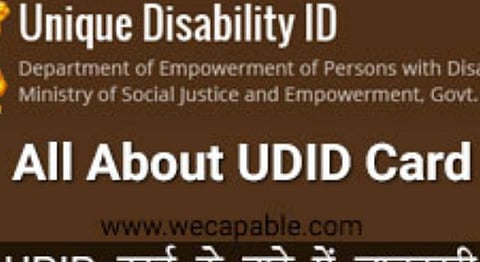
- #HGCREATORS
- #HGEXPLORE
- #HGVOICES
- #HGSHOP
- CAREERS
- ABOUT US
- CONTACT US

For People with Disabilities (PwD) it is not uncommon to get documents after documents to prove the legitimacy of their condition and their need for government assistance. To solve this issue, the Indian Government announced last Friday that they will be providing unique identity card for the 27 million-strong differently-abled population in the country.
The UDID will aim at collecting information about the education, employment and income status of people with disabilities on a national level to ascertain the common trends and later remedy them.
The database will bring all of them under a single umbrella and decrease the bureaucratic and medical procedures that are often a tool of harassment.
In a report by Hindustan Times, this initiative has been doing the rounds since 2014. “Currently, a disability certificate — issued to persons with over 40% disability — is required for availing government benefits. But there have been instances where a certificate issued by one state or a government department is not accepted by another.
The certificate is reviewed all over again by doctors and only when approved, can the person claim entitlement. This often results in PwDs being subjected to harassment. The unique card will do away with this anomaly as it will be valid across India,” said a source to HT in 2014.
Thaawarchand Gehlot, Minister for Social Justice & Empowerment, said that this initiative will bring benefits to PwDs and empower them in more ways than one. He said that ‘the government had brought in transparency by using the mode of direct benefits transfer, and was committed to empowering persons with disabilities.’
He also said that the government plans on establishing the first Central University for Disability Studies and Research in Kerala which would reportedly be implemented in other states by 2018.
Sputnik news reported that a colour-coded system will further diversify the process. “The UDID cards will have a coloured bar on one end to indicate the degree of disability. A red bar will indicate a disability of 80% and above, blue for a disability between 40% and 80% and yellow for a disability below 40%. The cards will also have a hologram to prevent any attempts of duplication,” the report said.
In an extensive report by Indian Express, Vinod Aggarwal, Secretary, Ministry of Social Justice and Empowerment spoke largely about social integration. ‘India launched the National Action Plan for skill development of 2.5 million persons with disabilities by the year 2022 through various schemes and financial assistance to improve accessibility, rehabilitation, education, vocational training and self-employment.
“Raising awareness among public to promote legal rights of persons with disabilities and also to generate affirmative public perception towards them is a priority,” he said in the report.
‘Affirmative Public Perception’ would be challenging to achieve as the society as a whole still discriminates against PwDs causing unemployment and subsequent poverty. In Ban-Ki-Moon’s words, ‘disability is not inability’ and the sooner we realize that, the more it will help the nation in tapping the talent and human resource in PwDs.
Feature Image Courtesy: Monika Sarkar for CNN
